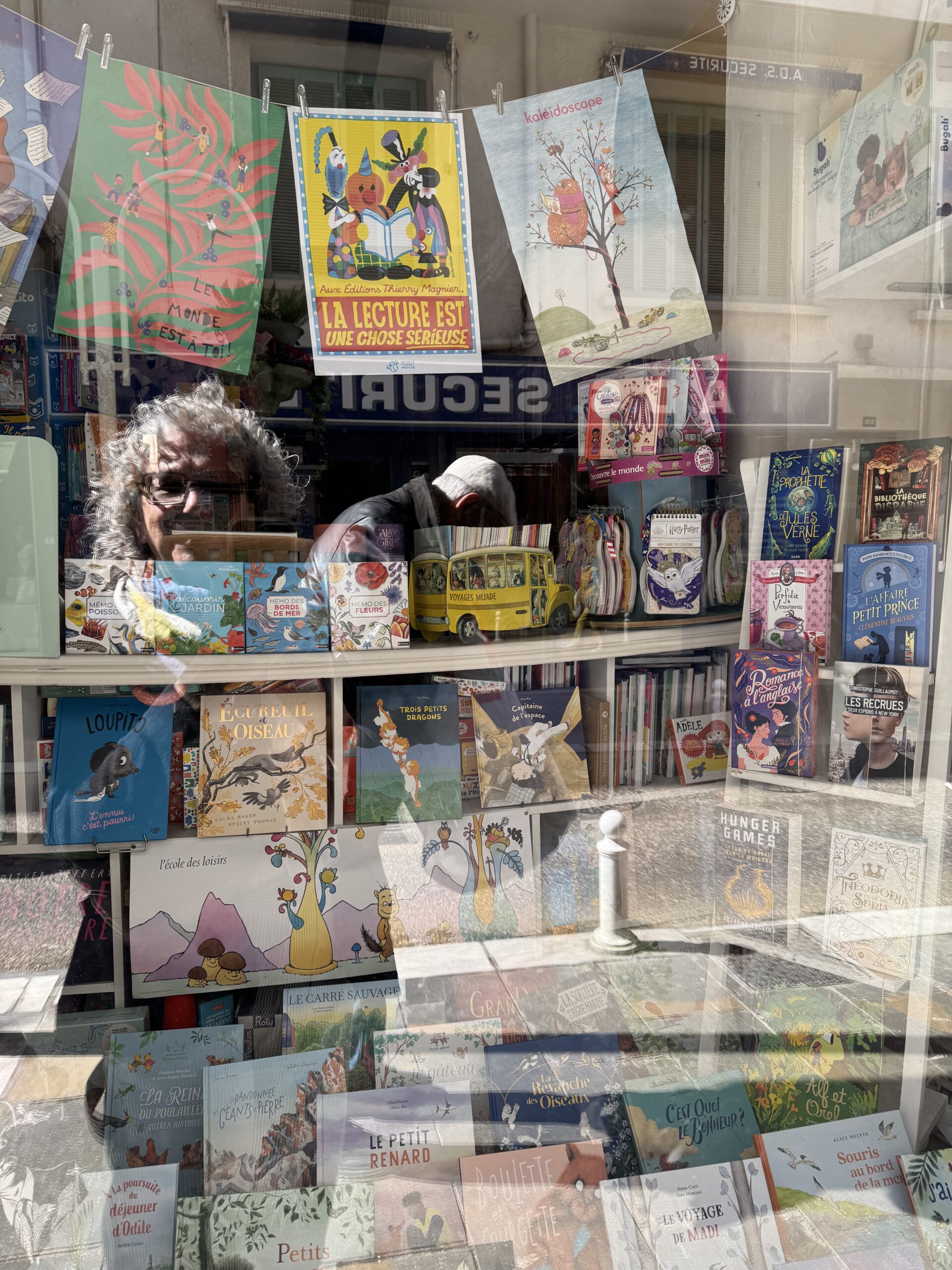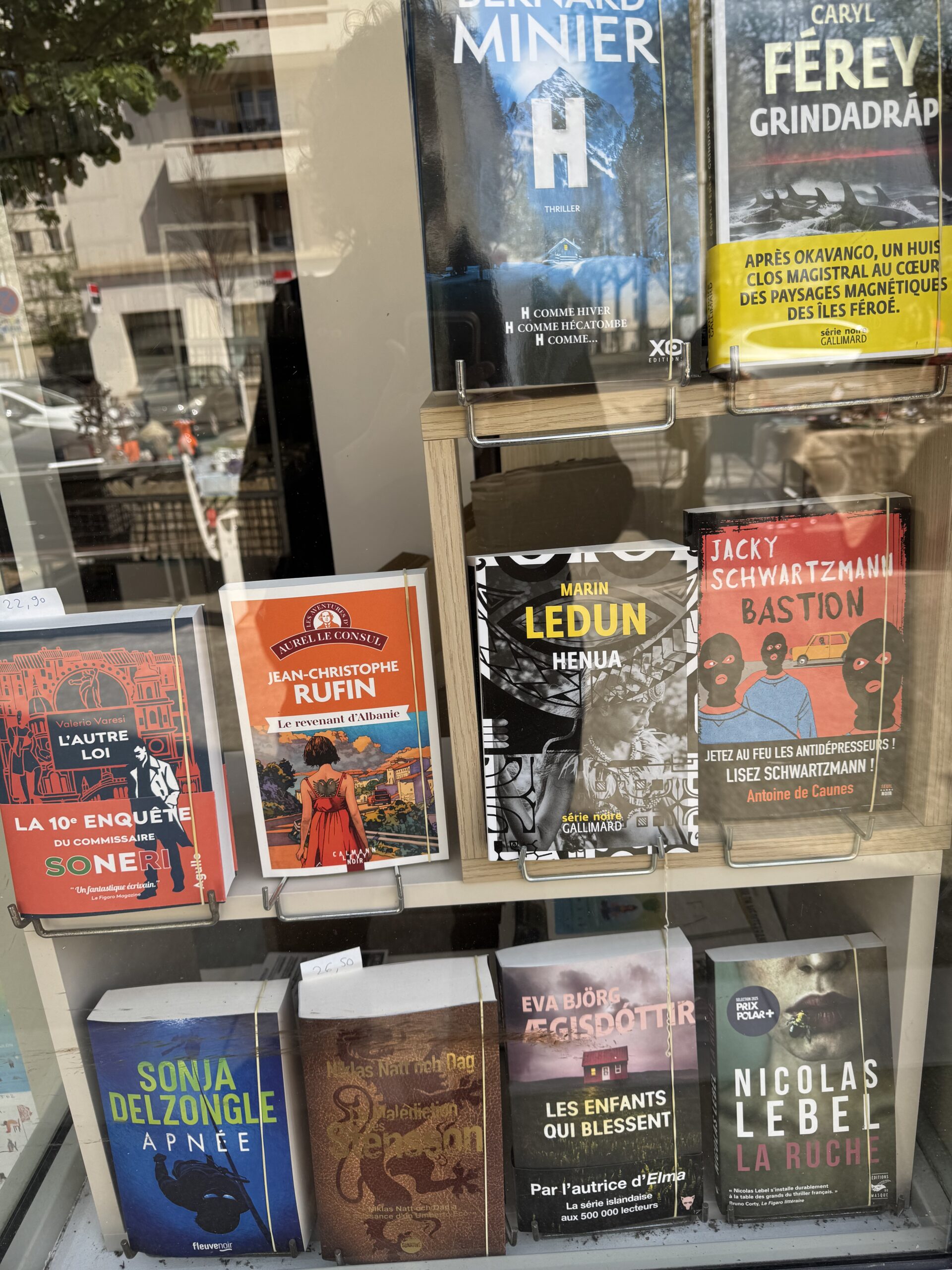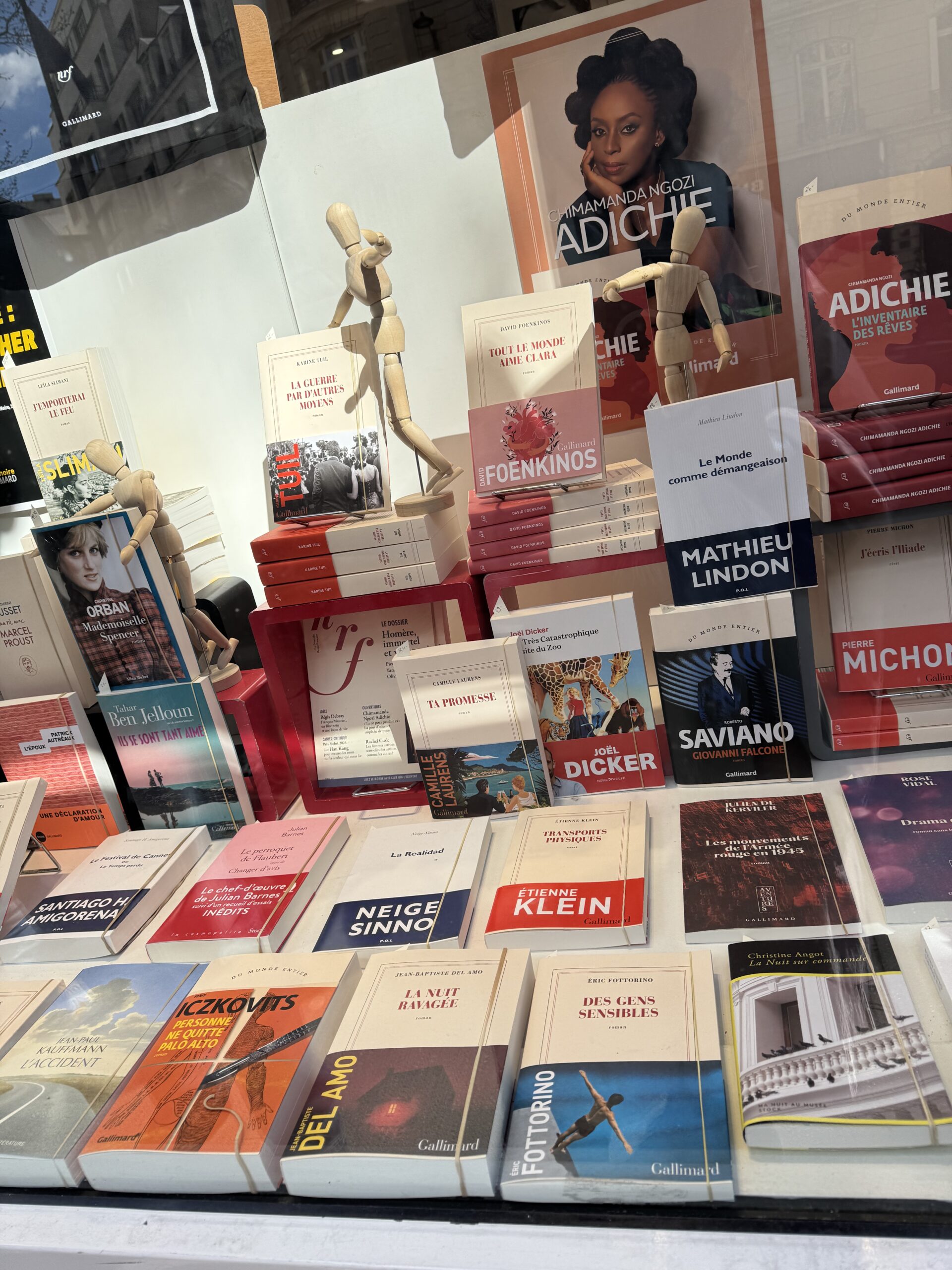I’ve been away from home for over a month now, having spent time in Paris with a daughter and granddaughter, then with a friend in Paris and Reims, then Paul joined me and we traveled to Toulon, and from there took a ferry to Sardinia where we hiked for a week. Then another ferry and a train ride to Rome to meet up with our ex-pats and head to Albania where we’re now mid-visit. Honestly, I have been too tired and my days too full to do as much reading as I generally do. But I have a few books to tell you about, and then I hope you’ll recommend a few for all of us.

I’m also posting less than usual on Instagram (partly busy, partly just feeling ambivalent about the platform right now), and sadly, yes, much less here. I have managed to maintain a weekly (Sunday) post on Substack, and I hope to write a bit about my decision to be there and about my plans for the blog, my hopes for this community. But that won’t happen until after I get back home at the end of the month.
Meanwhile. . .
I say this every book post now, for those who are new here and as a reminder to regular readers: As usual, the numbering comes from my annual handwritten reading journal, and the italicized text below is directly transcribed from that journal’s pages (once upon a time, I simply included photographs of those pages, but too many of you found my handwriting tough to decipher, especially in the photographed format). Notes to myself, that is, so that I can remember a book and remember my response to it, rather than any attempt at a more polished, edited review.
I’ve used regular font for any additions to my journal notes and included references to any posts from my Instagram Reading account.
14. L’ultima Anguàna. Umberto Matino. Mystery/Giallo; Historical fiction; Read in Italian; Setting Trentino-Alto Aldige.
I read this hoping to get to Italian Book Club for discussion, but then had a colonoscopy scheduled that week. . .
Set in small mountain villages of Trentino Alto Aldige, mid-20th century. Two story-lines (and then as denouément begins, a 3rd earlier story-line is introduced) — history, fairy tales, and legends mix it up here.
Three kids in the summer of ’56 whose parents have to work so the kids are spending their vacation in a small mountain village (in the care of a woman who the parents’ friends have recommended). Left to wander freely in the woods and hills, to make friends with the locals, they make some intriguing discoveries and keep a few secrets. . .
And then all three are lost in a storm, found dead a day or two after flooding lessens.
Twelve years later Brigadiere Baldelli is asked to solve a crime in the same region and (having been involved in the search for the three children that stormy night) becomes convinced the two incidents are connected . . . and it all goes back to events that happened during the fascist years.
Great characters, so much local lore, dialect, the geographic setting reflected in the culture. I wish there were an English translation to share, but if it exists, I haven’t found it listed anywhere.

15. Roman Year: A Memoir. André Aciman. Memoir; Coming-of-Age; Mid-20th-century Rome; Refugee memoir; Italian-American writer; Exodus from Egypt.
I hadn’t read anything by Andrè Aciman before this (chose the book because I spend a fair bit of time in Rome!) — but his Call Me by Your Name was very popular and also critically well received, won several prizes, etc., and was made into a film.
I’ve copied some favourite passages into the back of my reading journal. I really enjoyed this memoir and now want to read his Out of Egypt memoir.
Passages I especially enjoyed:
Our young and stunning waitress was very pleased to speak in Greek, said she came from Rhodes and had learned to speak a variety of languages as a child, most notably French and some Turkish. On hearing that she could speak Turkish, both my father and Aunt Elsa moved from Greek to fluent Turkish. She was so pleased to shuttle between both tongues that she told us she also spoke Spanish. Then my father took a wild guess, “must be Jewish, then?” How did you know? “Because we come from the same stock.” At which all of us laughed. She offered us a bottle of retsina on the house. I had never liked retsina before, but on that night, I adored it. Then came the skewered meats, the rice, the aubergines and other fried vegetables, with their succulent sauces and so many “friandises” as the waitress called them, that by dessert and after finishing the whole bottle of wine, we were all three very happy. The waitress handed my father the check, but she did so with the impish grace of someone who pretends to have almost forgotten. (287)
And here’s another:
What I liked about some of these people was that, despite their wealth, which was so apparent in their furniture, their clothes, their hospitality, even in their heedless, debonair manner, they spoke Italian with a distinctive Roman accent. It made me realize that Romanaccio was not just a patois spoken by poor, uneducated people working in the market-place or yammering on crowded public buses, but a language that suddenly acquired a stylish, patrician panache.” (64)
He writes also of Madame Renato who spoke Italian
with words and expressions borrowed from every other language, though she knew none well enough to claim it as hers. Her mother tongue was no language but a hodgepodge of at least four that borrowed the imperfect from one language and grafted it to the conditional of another with an ease that verged on syntactic “sprezzatura.” (41)
And this, about his grandmother, and of the value of the ordinary:
What I loved about my grandmother was that she taught me about myself: that I loved laughter above so many things, that a room with a slice of cake and the residual scent of orange blossom, a fatuous conversation, be it even gossip of the most fallow sort, was of an order no less essential than those grand ideas I was struggling to master and bring into my life. Hers was a tame love, like Flora’s, not the savage, mutinous, hysterical kind I’d grown up with and wished to be rid of, all the while knowing that I couldn’t live without it. My mother’s love was obstinate, feral, while my grandmother’s was a mitigated, almost civil, cordial love that never drained the heart but didn’t necessarily fill it either. Her love was restful and composed and always measured, even rational, hence a touch skimmed. There was always hope when my grandmother was around. Hope was good enough. (166-167)
16. Les Oubliés du Dimanche. Valérie Perrin. French novel; popular fiction; domestic fiction; coming-of-age; family secrets; cross-generational friendship; lives of the elderly.
A young woman, raised by her grandparents along with her cousin after their parents (twin brothers and their wives) were killed in a car accident, seems to be stalled in her life. Justine has a desultory sexual relationship with someone whose name she claims not to know, who seems to like her and to treat her well, but whom she keeps at a distance except for semi-regular “sleepovers.”
She’s invested the most engagement in one of the elderly women she cares for in a Home for the Aged. And Perrin uses a structure similar to that of her earlier works to interweave 96-year-old Hélène Hel’s story with Justine’s. Listening to her favourite patient, Justine records Hélène’s love story — and its disruption by WWII — in a blue notebook. And she meets the young (and very attractive) man whom she believes to be Hélène’s grandson.
Once again, Perrin creates convincing connections across generations — and once again, there is a mystery to be untangled. Yes, accusations of sentimentality could be made — Heller McAlpine calls it a “pain au chocolat” of a book. “flaky but buttery, with a sweet center” — but there are strong, interesting characters, some compelling moral quandaries, and a mystery folded into that “sweet center.”
I read it in French — to boost my language skills while in France — but it’s available in an English translation as Forgotten on Sunday.

17. Mémoire de Fille. Annie Ernaux. French literature; Auto-fiction; Coming-of-Age; Women’s Sexuality; Abuse/Coercion/Shame; Nobel prize-winning writer; French writer; Feminist writer; Women’s History; How to Write our Younger Selves.
I found so much in this slim self-titled memoir that resonated with my own story, although the young woman Ernaux’s narrator (her retrospective older self, the writing “I”) was 18 in 1958 when the pivotal events take place — so 13 years older than I was. The distance from that young woman — so much so that Ernaux uses different voices for her narrating self and her remembering self — “I” and “she.”
Working through the pain, shame, defiance, denial, pride, etc. around her entry into her own sexuality (exploited, abused, mocked, then eventually, if tentatively, claimed) that have been blocked for decades — and that prove to have been an engine of creativity and a push towards an intellectual home in feminist thinking , after an education in which she excelled but which relegated her to a confusing sort of agency,
I think of my own years from 18-20, the intellectual journey that connected very much with gender and sexuality and that I negotiated mostly alone except for naïve reading that I’m nonetheless grateful for.
That will have to do for now. . . my Instagram post here.
But I highly recommend this book — available in English (translated by Alison L. Strayer) as A Girl’s Story. I know some of you have already read it, and I’d love to know what you thought of it, what it evoked for you.
That’s it for this month’s book post. I need to go read a few pages of my current book so that I have something to tell you about next month!
But first, perhaps you can catch me up with yours in the Comments section below. (And I’d also love to see you over at my Substack account where I’ve posted a bit about my current travels.)
from southern coastal Albania where there are views like this from tough hikes . . .
xo,
f

Hello I have been following g your post for several years
My husband and I are traveling g to Italy in two weeks
Do you have a book recommendation that is set in Italy, with a possible art theme
Thanks
Author
I spent a bit of time looking through my annual book list posts to find a few titles for you. Many more on those lists — if you’d like to browse, here’s a link to the lot of them: . But for now, I’d suggest Sarah Winman’s Still Life, Frances Mayes’ Women in Sunlight and Tom Rachman’s The Italian Teacher. So many mystery series. . . For memoirs, Kamin Mohammadi’s memoir La Bella Figura:How to Live, Love, and Eat the Italian Way, perhaps Hisham Matar’s memoir A Month in Siena, Diana Athill’s A Florence Diary.
I’ve been (w)racking my brain trying to remember what I was reading at home but the only thing that’s coming to me (and the most enjoyed) was A House in the Mountains : The Women Who Liberated Italy from Fascism (Caroline Moorhead) that someone here (Linda in Scotland I think; we read along the same lines, thank you Linda!). I got a copy from the library, read about one chapter and promptly ordered one of my own from our local bookstore (yes, McNally Robinson :)). So many familiar ‘faces’ in those pages. I should have waited until tomorrow to write my comment as it will be Liberation Day…
I brought some Rocco Schiavone short stories along for the trip but he’s so grumbly with his lists of the things that only exist to rompere le palle. Ah well. The stories are engrossing enough to make you forget you’re reading in another language which is just perfect for me. And my teacher gave me leads on a few bookstores to check out although I must be very careful re suitcase space.
I put laundry out during the lunch period thinking I’d go out when everything opened again…but it suddenly started to pour and I not only had to pull in the rack (of course it’s too big for the doorway) and take everything off the line but my walk was spoiled. Now the sun is shining again…I think I’ll risk it. I did not know Sicily was prone to sudden downpours but I do think it is prone to drought so this is likely welcome rain.
Author
Something about hanging out laundry in another country to really make you feel you live there, however temporarily and albeit the rain. . . There was a line slung on the wrought-iron railing outside our window in the little Sardinian hotel we stayed in our first two nights, so I hang out a cotton shirt (chose to dry my undies inside, though, since the window faced the town’s Main Street ;-))
I quite like Schiavone’s grumbling and have added considerably to my Italian vocabulary thanks to it! 😉
Frances,thank you. You were reading a lot, considering the circumstances. I’ve checked Umberto Matino, the giallo sounds really good and I was curious enough to buy and try it in original-but there is only paperback edition,so I’ll wait
Aciman is added to my list,as well as Perrin
I’ve finished Mémoire de Fille a couple of months ago. In March I’ve read her The Young Man,about an affair during her fifties, with a student 30 years younger. She never ceases to astonish with her simple yet precise and powerful narrative,dettached but still vulnerable
Madeleine Gray’s Green Dot follows Hera,young unsecure women who feels lost in life and is having an affair with a married colleague. As usual lately in reviews,it is described as “hilarious”- I didn’t find it funny nor did I like the main characters,but it was interesting reading about their development,how lives could be destroyed from, not love or passion, but…. I don’t know,boredom maybe?
Eva Baltasar’s awarded novel Boulder is a LGBT story about love,freedom,partnership and choices one makes in life. About transformations after a couple gets a baby (where one partner wants it and the other just goes with it). Excellent book,universal, it could be a heterosexual couple story as well
J. M. Hall mysteries main characters are retired teachers Pat,Liz and Thelma. I was sceptical at first,but now love these cozy mysteries-I’ve read all four of them
Alison Borstein’s (Three-Word Method )Wear it Well
I’ve listened to Craig Brown’s Ma’am Darling, Princess Margaret biography
Have wonderful holidays in Albania!
Dottoressa
Author
As always, I’m adding to my TBR list thanks to you. And yes, this is what’s so striking about Ernaux’s writing — how can she manage to seem at once detached AND vulnerable?!
I’ll look for Boulder at my library, thank you!
The Matino novel sounds like a book I would love to read and maybe it will be translated at some point, perhaps for our Global book club? I have recently read, Beautiful World, Where Are You, Sally Rooney, Long Island, Colm Toibin, Irish, a sequel to his very successful Brooklyn, The Underground Library, Jennifer Ryan, historical fiction taking place in London during the blitz, one of several novels she has written about this period. I read Ina Garten’s autobiography, Be ready When the Luck Comes. I have a couple of her cookbooks and have probably used them more than most of the others. Most recently read book was the Authenticity project, Clare Pooley, a group unlikely individuals bond at a cafe in London, Read for book club. Deliberately chosen as it was not so dark as our last selection. I also read The Personal Librarian. Marie Benedict and Victoria Murray. A fictionalized biography of Belle La Costa Green. She was the librarian for financier JP Morgan who built a Renaissance library in the middle of New York City, now the Morgan Library and Museum, at the turn of the last century. In addition to collecting huge amounts of money he collected rare books, manuscripts and art. Bell was instrumental in amassing his vast collection. Belle was the daughter of a well known at the time black activist, Richard Greener. Her mother and siblings left him and changed the name in order to pass as white. Belle lived in fear of being found out, even though she was a popular and engaging figure in New York society. This book was read in preparation for a visit to the Morgan Library, which featured a special exhibit of her life and contributions to the historic Manhattan treasure. This happened last week and was a reminder that in spite of so much ugliness of every kind around these days there is still beauty in the world.
Author
Thanks for this comment, Darby — sorry I didn’t respond earlier, but somehow your comment got buried among the 73 Spam comments, mostly from Russian bots, apparently!
Your book lists are alwayts so interesting (and again, I’m very envious of your book clubs, particularly the global one).
I’m especially pleased to know that you read the fictionalized biography of Belle LaCosta Green — it seems more important than ever to look to narratives that offer different versions of your country than the one you’re living in now. A reminder, as you say, and also an inspiration of what is possible with persistence. . .